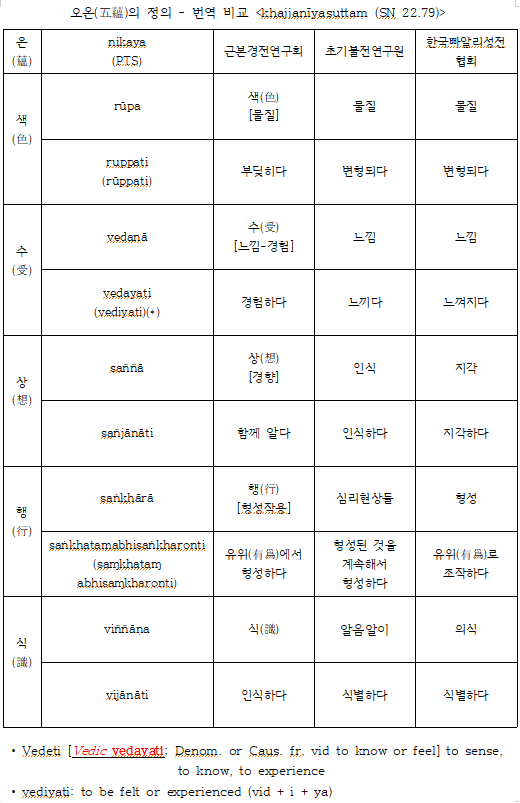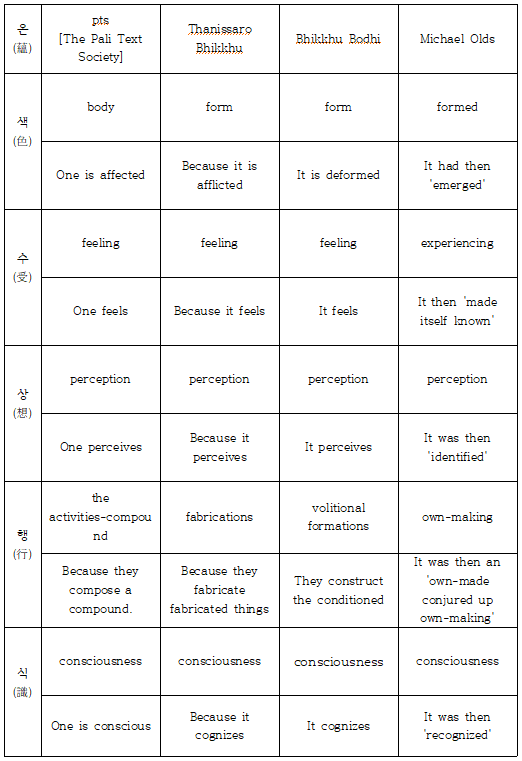

※ 행(行)의 상세 정의
kiñca, bhikkhave, saṅkhāre vadetha? saṅkhatamabhisaṅkharontīti kho, bhikkhave, tasmā ‘saṅkhārā’ti vuccati. kiñca saṅkhatamabhisaṅkharonti? rūpaṃ rūpattāya saṅkhatamabhisaṅkharonti, vedanaṃ vedanattāya saṅkhatamabhisaṅkharonti, saññaṃ saññattāya saṅkhatamabhisaṅkharonti, saṅkhāre saṅkhārattāya saṅkhatamabhisaṅkharonti, viññāṇaṃ viññāṇattāya saṅkhatamabhisaṅkharonti. saṅkhatamabhisaṅkharontīti kho, bhikkhave, tasmā ‘saṅkhārā’ti vuccati.
• 근본경전연구회
비구들이여, 그러면 무엇을 행(行)[saṅkhārā]이라고 말하는가? 유위(有爲)에서 형성한다고 해서 행(行)이라고 불린다. 그러면 무엇을 유위(有爲)에서 형성하는가? 색(色)을 색(色)이 아(我)라는 유위(有爲)[saṅkhata]에서 형성한다[abhisaṅkharoti]. 수(受)를 수(受)가 아(我)라는 유위(有爲)에서 형성한다. 상(想)을 상(想)이 아(我)라는 유위(有爲)에서 형성한다. 행(行)을 행(行)이 아(我)라는 유위(有爲)에서 형성한다. 식(識)을 식(識)이 아(我)라는 유위(有爲)에서 형성한다. 비구들이여, 그러므로 유위(有爲)에서 형성한다고 해서 행(行)이라 한다.
• 초기불전연구원
비구들이여, 그러면 왜 심리현상들이라 부르는가? 형성된 것을 계속해서 형성한다고 해서 심리현상들이라 한다. 그러면 어떻게 형성된 것을 계속해서 형성하는가? 물질이 물질이게끔 형성된 것을 계속해서 형성한다. 느낌이 느낌이게끔 형성된 것을 계속해서 형성한다. 인식이 인식이게끔 형성된 것을 계속해서 형성한다. 심리현상들이 심리현상들이게끔 형성된 것을 계속해서 형성한다. 알음알이가 알음알이이게끔 형성된 것을 계속해서 형성한다. 비구들이여, 그래서 형성된 것을 계속해서 형성한다고 해서 심리현상들이라 한다.
• 한국빠알리성전협회
수행승들이여, 왜 형성이라고 하는가? 유위로 조작하는 까닭으로 수행승들이여, 형성이라고 한다. 무엇을 유위로 조작하는가? 물질을 물질인 것으로 유위로 조작해내며 느낌을 느낌인 것으로 유위로 조작해내며 지각을 지각인 것으로 유위로 조작해내며 형성을 형성인 것으로 유위로 조작해내며 의식을 의식인 것으로 유위로 조작해낸다. 수행승들이여, 유위로 조작하기 때문에 형성이라고 한다.
• pts[The Pali Text Society]
And why, brethren, do ye say 'the activities-compound'? Because they compose a compound. That is why, brethren, the word 'activities-compound' is used. And what compound do they compose? It is body that they compose into a compound of body. It is feeling that they compose into a feeling-compound. It is perception that they compose into a perception-compound; It is the activities that they compose into an activities-compound; It is consciousness that they compose into a consciousness-compound. They compose a compound, brethren. Therefore the word '(activities)-compound' is used.
• Thanissaro Bhikkhu
And why do you call them 'fabrications'? Because they fabricate fabricated things, thus they are called 'fabrications.' What do they fabricate into a fabricated thing? From form-ness, they fabricate form into a fabricated thing. From feeling-ness, they fabricate feeling into a fabricated thing. From perception-hood...From fabrication-hood...From consciousness-hood, they fabricate consciousness into a fabricated thing. Because they fabricate fabricated things, they are called fabrications.
• Bhikkhu Bodhi
"And why, bhikkhus, do you call them volitional formations? 'They construct the conditioned,' bhikkhus, therefore they are called volitional formations. And what is the conditioned that they construct? They construct conditioned form as form; they construct conditioned feeling as feeling; they construct conditioned perception as perception; they construct conditioned volitional formations as volitional formations; they construct conditioned consciousness as consciousness. 'They construct the conditioned,' bhikkhus, therefore they are called volitional formations.
• Michael Olds
And why, beggars, call it 'own-making'? It was then an 'own-made conjured up own-making' beggars, is why it is called 'own-making.' And what was the 'own-made conjured up own-making'? The emergence of form was an own-made conjured up own-making, the making itself known of experience was an own-made conjured up own-making, the perception of identification was an own-made conjured up own-making, the own-made conjuring up of own-making was an own-made conjured up own-making, the consciousness of self-consciousness was an own-made conjured up own-making. It was then an 'own-made conjured up own-making' beggars, is why it is called 'own-making.'




 교리공부
교리공부